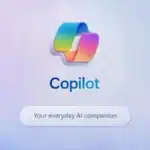Microsoft releases KB5034765 update for Windows 11, moving the Copilot button and fixing the Start menu

If you've been irritated by the positioning of the Copilot button in Windows 11, the newly released KB5034765 update is for you.
This month’s patch for Windows 11 not only boosts security and fixes numerous bugs, it also sees the button for accessing Microsoft's AI-powered assistant moving. It effectively replaces the "show desktop" button in the taskbar.
What's the best option for businesses -- open-source or commercial AI services?

In the past year, Generative AI (GenAI) availability for businesses has swept the market, offering significant boosts in productivity. To successfully seize this opportunity, however, businesses will need to ensure they invest in the right solutions.
Faced with options like commercial AI services and customizable open-source Large Language Models (LLMs), business leaders must navigate a complex landscape of risks and benefits. This choice, influenced by factors like speed to market and data security, is crucial for companies looking to strategically invest in GenAI.
AI's challenge to internet freedom

In October 2020, observing International Internet Day, I spoke about the threats to Internet freedom. A lot has happened in less than four years, and a lot has changed. But the threats did not go away. On the contrary, Internet users and their freedoms are in more danger now than ever.
In February 2024, as we observe Safer Internet Day, it is necessary to reiterate that there is no safety without freedom, online or offline. Especially as the enemies of both are now equipped with the most powerful tool for cyber oppression yet -- Artificial Intelligence (AI).
Microsoft is improving the look of gaming with AI Super Resolution in Windows 11 24H2

The latest use Microsoft has found for artificial intelligence is to boost graphics and performance in games in Windows 11. As can be seen in the latest preview builds of the operating system, the company is preparing to unleash an AI-powered feature called “super resolution”.
Also known as AI SR and Auto SR, super resolution can be applied on an app-by-app basis. In order to take advantage of the feature, users will have to have a PC with an AI NPU -- a requirement that is likely to become increasingly common.
Windows 11: Even Notepad gets AI support

If you thought that Microsoft was done adding AI to its products then you are mistaken. It appears that the company is just getting started. The latest program to get AI support is the plain text editor Notepad.
Microsoft has improved Notepad significantly since the release of Windows 11. Recent updates introduced automatic saving of text, word counts, and tabs to the plain text editor. All of these features were welcome by Notepad users, as they improved the text editor.
Microsoft quietly fixes Windows 11 Copilot bug that caused desktop icons to move around

While there has been much excitement and interest in Copilot, Microsoft’s AI-powered assistant has not been without problems. For some time now, for instance, there has been an issue with desktop icons moving around on systems with multiple monitors.
Now, three months since first acknowledging the problem, Microsoft has announced that the issue has been resolved. Interestingly, the fix was applied without the need for an update to be issued.
Google Bard becomes Gemini and adds a mobile app

Google's chat-based AI tool Bard, launched last year, has been rebranded as Gemini. Google says that this is the most capable of its AI tools to date. So what does the change from poet to star sign deliver?
The Gemini Pro 1.0 model is available in over 40 languages and more than 230 countries and territories. Thee are also two new additions -- Gemini Advanced and a mobile app-- to make it easier to collaborate with Google AI.
Cybercrime tactics evolve to embrace AI and online ads

A new report from BlueVoyant looks at the new risks organisations face from outside the traditional IT perimeters.
In particular, cybercriminals are using AI to create more effective phishing campaigns, and employing online adverts to lure victims to malicious websites.
Safeguards for using Artificial Intelligence in election administration

Election administration is an essential component of the democratic process, but is also very challenging. The number of voters involved, which can climb into the tens of millions, requires the use of systems that have been fine-tuned for maximum efficiency. Managing the complexity of those systems, which are often spread out over vast geographical areas, is daunting, especially considering the task often relies on a volunteer staff with high turnover rates. Looming over the entire enterprise is the requirement for unquestionable accuracy and crystal-clear transparency.
Artificial intelligence, which thrives at optimizing systems for maximum efficiency and accuracy, has the potential to provide valuable support for election administration. Leveraging it for that purpose, however, also requires that strong safeguards be put in place.
Tech businesses turn to AI to improve revenues and compliance

Process efficiency and cost-saving are top priorities for life sciences and high-tech executives, with greater emphasis placed on advanced analytics and artificial intelligence (AI) to achieve these priorities according to a new report.
The study from Model N shows three-quarters of executives say their current approach to revenue optimization needs improvement, and survey responses show plans to bolster revenue operations by incorporating advanced analytics (68 percent), AI (59 percent), and robotic process automation (46 percent).
Qualcomm says the 'next version of Windows' will launch in mid-2024... but is it Windows 12?

Confusion surrounds Microsoft's plans for Windows 12, with conflicting rumors suggesting different launch dates. Development is clearly well underway at Microsoft, and Qualcomm has just added strength to idea that Windows 12 could launch later this year.
While we've heard that Microsoft only plans to release the Windows 11 24H2 update this year, holding off releasing Windows 12 until 2025, Qualcomm's suggestion of a mid-2024 launch for Windows 12 is not the first time this release window has been suggested.
Who will protect us from AI-generated disinformation?

Generative AI has gone from zero to a hundred in under a year. While early, it’s shown its potential to transform business. That we can all agree on. Where we diverge is on how to contain the dangers it poses. To be clear, I am pro innovation, and far from a fearmonger. But the recent uptick in misinformation -- largely aimed at polarization around controversial issues of the moment -- has made it clear that, if left unchecked, gen AI could wreak havoc on societies.
We’ve seen this movie before with social media, but it took years and hard lessons for us to wake up to its flaws. We’ve (presumably) learned something. The question today is who will help stem the tide of reality distortion from gen AI, and how?
Get Copilot Pro says Microsoft in latest Windows 11 ads push

Many Windows users have access to Microsoft Copilot, a built-in AI tool. This tool is free to use. Microsoft created Copilot Pro as an optional subscription-based service. Available for $20 per user and month, Copilot Pro promises "priority access to GPT-4 and GPT-4 Turbo during peak times". A subscription delivers answers, content, and generated AI images faster, according to Microsoft's description of the service.
Subscribers get two additional benefits. Designer, which allows users to use AI to generate images, gets 100 boosts per day. Boosts prioritize requests so that results are returned faster. Designer still works without boosts, but it may take longer to generate and return image creations to the user.
How AI is changing the way developers work [Q&A]

The fear of software developers losing their jobs to AI is a concern for many people in the industry, but are these fears really justified?
Mike Loukides, VP of emerging tech content at O'Reilly Media, believes that AI can enhance the developer role rather than replace it. We spoke to him to find out how, with the right tools and training, the endpoint of this AI revolution won't lead to unemployment, but rather to better software.
Five ways that will transform the developer experience in 2024

In 2024, the rate of innovation is set to skyrocket, as organizations develop new digital products and services at pace. This growing demand for new software is putting extra pressure on developers.
As these trends gain momentum, it’s vital organizations help developers to keep up and do more with less, so they can iterate at speed without sacrificing on quality or security. Here are five ways organizations can maximize developer productivity and help them adjust to a rapidly changing world:
Recent Headlines
BetaNews, your source for breaking tech news, reviews, and in-depth reporting since 1998.
© 1998-2025 BetaNews, Inc. All Rights Reserved. About Us - Privacy Policy - Cookie Policy - Sitemap.